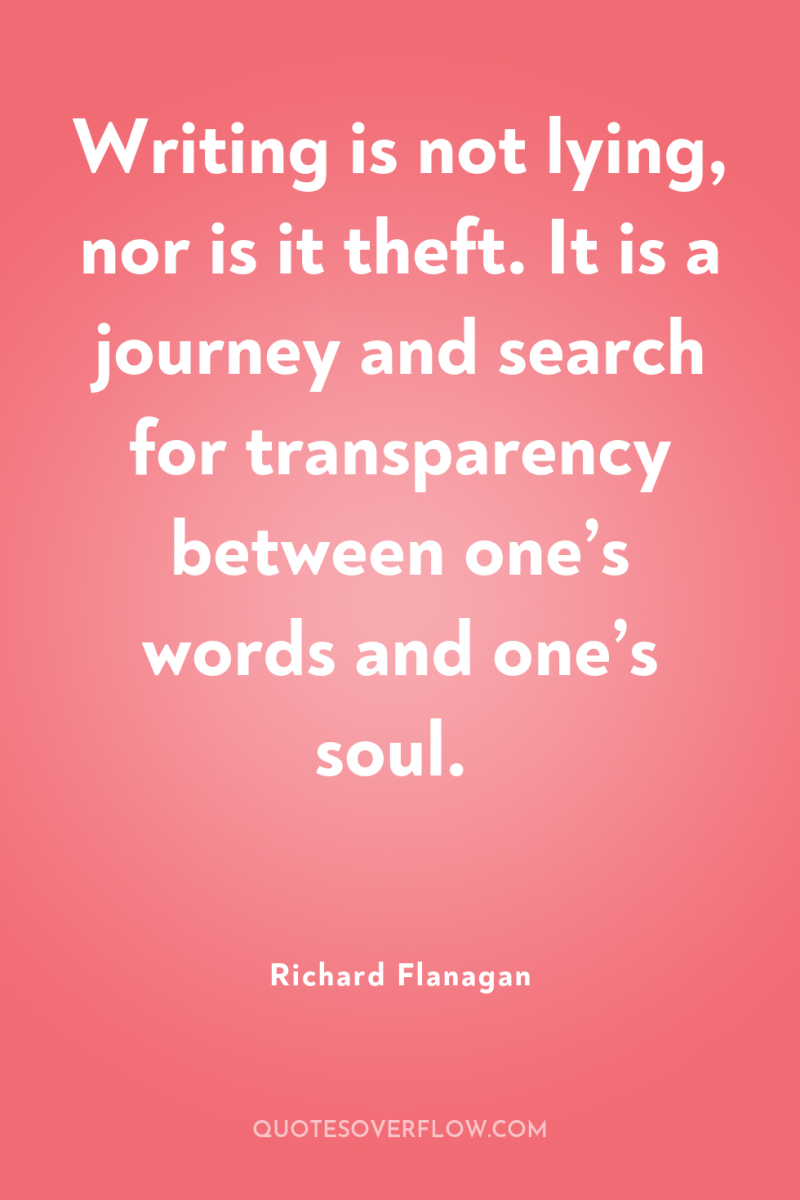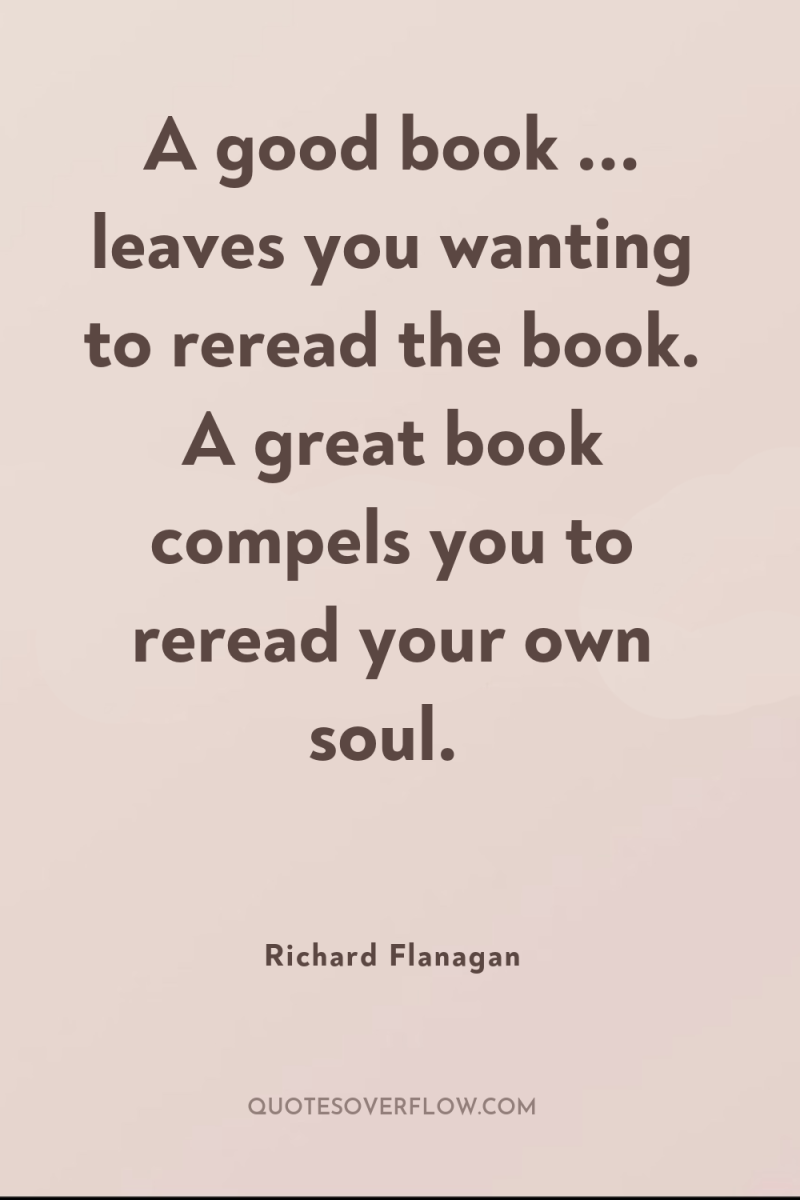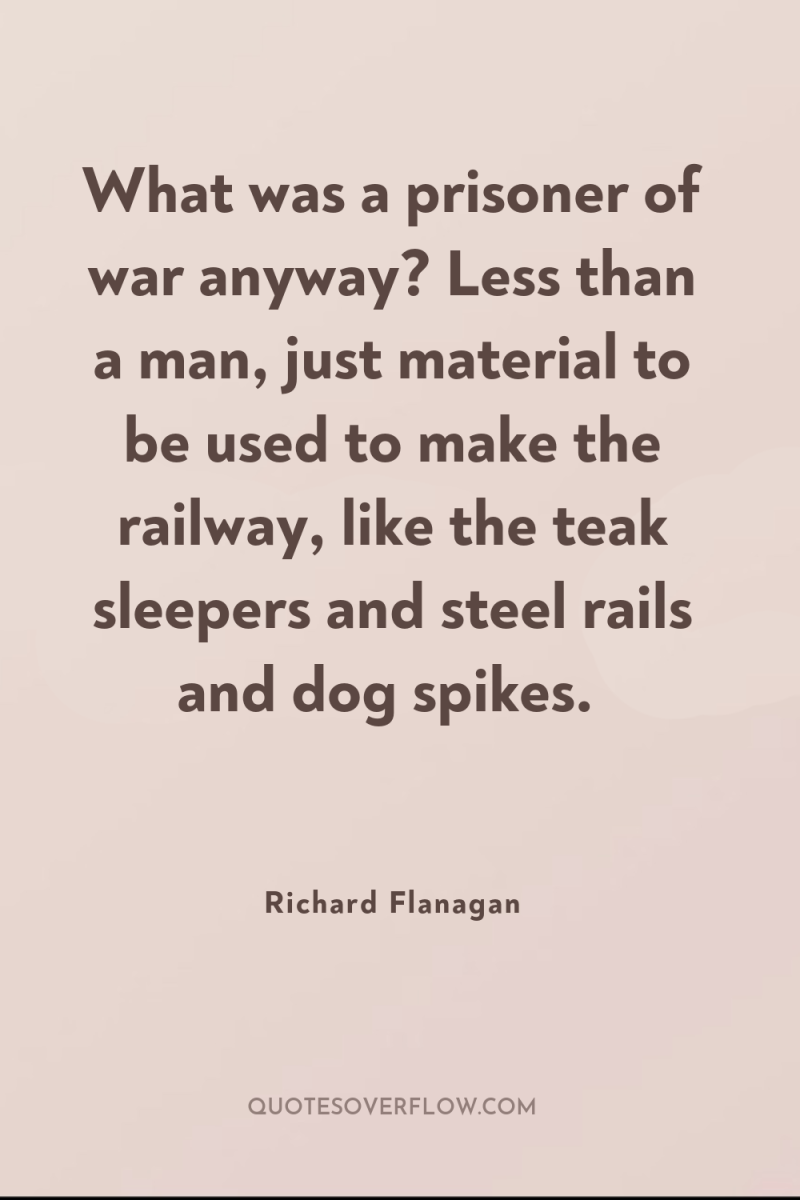
1
Writing is not lying, nor is it theft. It is a journey and search for transparency between one’s words and one’s soul.Richard Flanagan

2
A good book ... leaves you wanting to reread the book. A great book compels you to reread your own soul.Richard Flanagan
3
A good book, he had concluded, leaves you wanting to reread the book. A great book compels you to reread your own soul. Such books were for him rare and, as he aged, rarer. Still he searched, one more Ithaca for which he was forever bound.Richard Flanagan

4
What was a prisoner of war anyway? Less than a man, just material to be used to make the railway, like the teak sleepers and steel rails and dog spikes.Richard Flanagan
5
Men's lives are not progressions, as conventionally rendered in history paintings, nor are they a series of facts that may be enumerated & in their proper order understood. Rather they are a series of transformations, some immediate & shocking, some so slow as to be imperceptible, yet so complete & horrifying that at the end of his life a man may search his memory in vain for a moment of correspondence between his self in his dotage & him in his youth.Richard Flanagan
6
Rough work with a soul will always be open to all, including condemnation & reviling, while fine work housing emptiness is closed to all insults & is easily ivied over with paid praisesRichard Flanagan
7
-to judge us all through the machine of the Commandant's monstrous fictions! As though they were the truth! As though history & the written word were friends, rather than adversaries!Richard Flanagan
8
Tracker Marks was of a different opinion. Though he seemed more white than a white man, he had no time for their ways. For him his dress, his deportment was no different than staying downwind in the shadows of trees when hunting, blending into the world of those he hunted, rather than standing out from it. Once he had excelled at the emu dance & the kangaroo dance; then his talent led him to the whitefella dance, only now no-one was left of his tribe to stand around the fire & laugh & praise his talent for observation & stealthy imitation. The whites have no law, he told Capois Death, no dreaming. Their way of life made no sense whatsoever. Still, he did not hate them or despise them. They were stupid beyond belief, but they had a power, & somehow their stupidity & their power were, in Tracker Marks’s mind, inextricably connected. But how? he asked Capois Death. How can power & ignorance sleep together? Questions to which Capois Death had no answer. .Richard Flanagan
9
Because courage, survival, love–all these things didn’t live in one man. They lived in them all or they died and every man with them; they had come to believe that to abandon one man was to abandon themselves.Richard Flanagan
10
As they made their way to the coast, he bemoaned the hotel trade in the manner, Dorrigo felt, that those who love what they do bemoan their passion the most.Richard Flanagan
11
But what reality was ever made by realists?Richard Flanagan
12
The tourists had money and we needed it; they only asked in return to be lied to and deceived and told that single most important thing, that they were safe, that their sense of security–national, individual, spiritual–wasn’t a bad joke being played on them by a bored and capricious destiny. To be told that there was no connection between then and now, that they didn't need to wear a black armband or have a bad conscience about their power and their wealth and everybody else’s lack of it; to feel rotten that no-one could or would explain why the wealth of a few seemed so curiously dependent on the misery of the many. We kindly pretended that it was about buying and selling chairs, about them asking questions about price and heritage, and us replying in like manner. But it wasn’t about price and heritage, it wasn’t about that at all. The tourists had insistent, unspoken questions and we just had to answer as best we could, with forged furniture. They were really asking, 'Are we safe?' and we were really replying, 'No, but a barricade of useless goods may help block the view.' And because hubris is not just an ancient Greek word but a human sense so deep-seated we might better regard it as an unerring instinct, they were also wanting to know, 'If it is our fault, then will we suffer?' and we were really replying, 'Yes, and slowly, but a fake chair may make us both feel better about it.Richard Flanagan
13
The idea of the past is as useless as the idea of the future. Both could be invoked by anybody about anything. There is never any more beauty than there is now. There is no more joy or sorrow or wonder than there is now, nor perfection, nor any more evil nor any more good than there is now.Richard Flanagan
14
To be fair to them, they were only after something that walled them off from the past and from people in general, not something that offered any connection that might prove painful or human. Thet wanted stories, I came to realise, in which they were already imprisoned, not stories in which they appeared along with the storyteller, accomplices in escaping.Richard Flanagan
15
Perhaps reading and writing books is one of the last defences human dignity has left, because in the end they remind us of what God once reminded us before He too evaporated in this age of relentless humiliations–that we are more than ourselves; that we have souls.Richard Flanagan
16
I do not share the pessimism of the age about the novel. They are one of our greatest spiritual, aesthetic and intellectual inventions. As a species it is story that distinguishes us, and one of the supreme expressions of story is the novel. Novels are not content. Nor are they are a mirror to life or an explanation of life or a guide to life. Novels are life, or they are nothing.Richard Flanagan
17
All life is only allegory and the real story is not here...Richard Flanagan
18
It was as if life could be shown but never explained, and words - all the words that did not say things directly - were for him the most truthful.Richard Flanagan
19
I am part of all that I have met.Richard Flanagan
20
Why at the beginning of things is there always light? Dorrigo Evans' earliest memories were of sun flooding a church hall in which he sat with his mother and grandmother. A wooden church hall. Blinding light and him toddling back and forth, in and out of its transcendent welcome, into the arms of women. Women who loved him. Like entering the sea and returning to the beach. Over and over.Richard Flanagan
21
In trying to escape the fatality of memory, he discovered with an immense sadness that pursuing the past inevitably only leads to greater loss.Richard Flanagan
22
In trying to escape the fatality of memory, he discovered with an immense sadness that pursuing the past inevitably only leads to greater loss. To hold a gesture, a smell, a smile was to cast it as one fixed thing, a plaster death mask, which as soon as it was touched crumbled in his figures back into dust.Richard Flanagan
23
Decades would pass. A few short sections would be formed in time into strangely resurrected, trunkless legs-tourist sites, sacred sites, national sites. For the line was broken, as all lines finally are; it was on longing for meaning and hope, but the annals of the past are a muddy story of chaos only. And of that colossal ruin, boundless and buried, the lone and level jungle stretched far away. Of imperial dreams and dead men, all that remained was long grass.Richard Flanagan
24
Much has been made about the death of the novel and the end of literature as it’s seen to be assailed by technology, by the web, by the many and varied new forms of entertainment and culture. I don’t share that pessimism because I think it is one of the great inventions of the human spirit.Richard Flanagan
25
... being true to the multitudes within himself that are one and many.Richard Flanagan
26
After a time he found and opened a book he had been reading that he had expected to end well, a romance which he wanted to end well, with the hero and heroine finding love, with peace and joy and redemption and understanding. Love is two bodies with one soul, he read, and turned the page. But there was nothing - the final page had been ripped away and used as toilet paper or smoked, and there was no hope or joy or understanding. There was no last page. The book of his life just broke off. There was only the mud below him and the filthy sky above. There was to be no peace and no hope. And Dorrigo Evans understood that the love story would go on forever and ever, world without end.Richard Flanagan
27
For an instant he thought he grasped the truth of a terrifying world in which one could not escape horror, in which violence was eternal, the great and only verity, greater than the civilisations it created, greater than any god man worshiped, for it was the only true god. It was as if man existed only to transmit violence to ensure its domain is eternal. For the world did not change, this violence had always existed and would never be eradicated, men would die under the boot and fists and horror of other men until the end of time, and all human history was a history of violence.Richard Flanagan
28
Once upon a time...long ago in a far-off place that everyone knows is not here or now or us.Richard Flanagan
29
The more people I am with, Dorrigo thought, the more alone I feel.Richard Flanagan
30
The Line welcomed rain and sun. Seeds germinated in mass graves, between skulls and femurs and broken pick handles, tendrils rose up alongside dog spikes and clavicles, thrust around teak sleepers and tibias, scapulas, vertebrae, fibulas and femurs.Richard Flanagan
31
He felt the withering of something, the way risk was increasingly eliminated, replaced with a bland new world where the viewing of food preparation would be felt to be more than the reading of poetry; where excitement would come from paying for a soup made out of foraged grass. He had eaten soup made out of foraged grass in the camps; he preferred food.Richard Flanagan
32
Virtue was vanity dressed up and waiting for applause.Richard Flanagan
33
In Australia the Man Booker is sometimes seen as something of a chicken raffle. I just didn’t expect to end up with the chicken.Richard Flanagan
34
The most important thing is our dignity. If we have that we can survive on bread and water.Richard Flanagan
35
A good book...leaves you wanting to reread the book. A great book compels you to reread your own soul.Richard Flanagan
36
There's always been something deeply disturbing about the Abbott government's attitude to women.Richard Flanagan
37
If you choose to take your compass from power, in the end you find only despair. But if you look around the world you can see and touch - the everyday world that is too easily dismissed as everyday - you see largeness, generosity, hope, change for the better. It's always small, but it's real.Richard Flanagan
38
A fictionalised memoir of my father would be a failure as a novel.Richard Flanagan
39
'The Narrow Road to the Deep North' is one of the most famous books of all Japanese literature, written by the great poet Basho in 1689.Richard Flanagan
40
I think if 'The Narrow Road To The Deep North' is one of the high points of Japanese culture, then the experience of my father, who was a slave laborer on the Death Railway, represents one of its low points.Richard Flanagan
41
Writing my novel 'The Narrow Road to the Deep North, ' I came to conclude that great crimes like the Death Railway did not begin with the first beating or murder on that grim line of horror in 1943.Richard Flanagan
42
In all the writers I admire, the common detonator is their courage to walk naked.Richard Flanagan